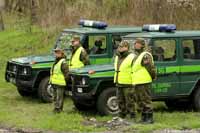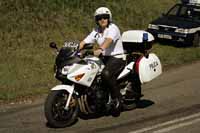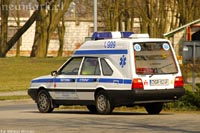Entry and Exit
Since December of 2007 you can enter and exit Poland without border controls.

Border police
The most of control stations aren't operating and some of them were already dismantled.
But the border still exists and in the border zone you can find a big contingent of the border police (Polish: "Straż Graniczna"), which controls sometimes in spot checks. What is more, the customs are still working and are allowed to control in a greater distance from the borderline. This is not only in Poland, but in Germany or the Czech Republic too.
Entry conditions
Some of the most important information for the entry conditions for "normal" trips: EU citizens need a valid personal document (a passport, or if they come from a country which signed a passport-free movement agreement with Poland, as did Germany - an indentity card will suffice). Children need documents too (registry in the parents passport, their own passport or a Child's Passport is necessary).
A visa is not necessary for EU-citizens.
Citizens of other countries can entry without a visa too if they have a valid unrestricted residence permit of an EU-country. To expl. a Turkish citizen with a residence permit (Niederlassungserlaubnis) from Germany can entry
Poland like a German citizen without a visa. If you want to stay for a longer time in Poland or you want to work in Poland, ask the Polish embassy for the conditions.
People of other countries should look for information at the website of the Polish embassy of their home country for the entry conditions. Also, the
website of the Polish Foreign Ministry contains a lot of useful
informations about the matter.
Pets
For taking pets with you to Poland, you need a pet passport, a registration by a microchip or a tattoo and a vaccination against rabies affirmation. More information you can get at the Polish embassy or ask your veterinarian.
Driving in Poland
Driving a car in Poland is not very different from driving in other European countries (of course, if you come e.g. from the UK you should know that you have to drive on the right).
The streets are sometimes not so good as in Germany, but in the Neumark they did a lot in the last years and some streets are renewed and very good. And the traffic intensity is not so high, you can go through
the wonderful alleys without stress. Be careful in some towns and villages as you may sometimes find large potholes in the roads.
The direction signs are good, near the borders sometimes in two languages, but sometimes you will find the signs directly at the place, where you have to change the direction and not, as in Germany, some meters before. If you see the traffic sign, you should drive a little bit more slowly, maybe you have to turn off directly at the sign.
Traffic regulations
There are some special regulations which you have to consider. You are obliged to drive with the lights on during the day too. If the driver is not the owner of the car, he will need a written warrant for using the car. There is no duty
to take the green insurance card with you but its easier to handle the insurance problems in case of a traffic incident if you have the card.
You should consider the traffic regulations as the penalties could be painful.

Police
Also, if you think sometimes in Poland all Polish car drivers would like to be racing drivers and if they take speed limits only as
an advice and not a duty, you should better adhere to these limits. Especially on the cross-border main streets or near big cities (like Gorzow Wielkopolski) you will sometimes find police speed controls.
If a car comes from the opposite direction and the driver is flashing, beckoning or giving another sign, you can be sure with high certainty, that there is a police control nearby.
To stay together against the authorities is an popular "sport" in Poland and fortunately, there is no exception for foreigners ;-)
The detailed traffic regulations you can find on the websites of the Polish embassies too.
In Poland, one is allowed to drive only if the blood alcohol content level does not exceed 0.02%. Severe penalties, including imprisonment and revoking the offender's driving license, can be imposed on those who attempt to drive whilst above the legal limit, thus it is better to avoid drunk driving. It has to be noted that the same limits and penalties apply also for riding bicycles under the influence of alcohol.
Policemen in uniform or in plain clothes are authorized to control and stop cars in cities at any time. Beyond the city limits, this is allowed during the day only for uniformed policemen or for policemen in plain clothes only
if they have a police car and during the night it is allowed only by policemen in the uniform. Police cars are marked with the word "Policja".
Fueling
In Poland, you will find almost only unleaded petrol. Its name in Poland is "Benzyna bezolowiowa". Often you will see a striketrough "Pb" as a sign for unleaded petrol. And you will find the octane rating:
Pb 91 = normal petrol
Pb 95 = super petrol
Pb 98 = super plus petrol.
E-10 is normally not for sale at Polish petrol stations.
Diesel fuel is marked with "ON" ("olej napedowy").
The quality of the petrol is not different from that in Germany, because a lot of them comes from the same big storages in the German north-eastern area.
Nevertheless, there are rumors that some petrol stations are watering down the petrol (I spoke with a lot of Germans not far away from the border, who have been buying their fuel in Poland for more than
15 years, and nobody could confirm that he ever had a problem with the Polish fuel by own experience). However, if you are fearful of potential problems related to the fuel quality, you can fill your tank only at the stations of the
big brand companies, which you can find very often in Poland, they never would destroy their image with illegal operations.
Car-thefts and security
If possible, use parking areas secured during the night
(often at hotels, etc.), close your car and don't leave valuables visible from the outside in your car.
Neither I nor my friends have ever experienced something happening to our cars in Poland. Don't be afraid, there are not as many cars stolen as people think.
Of course, it can happen, but it can happen in Frankfurt or in Amsterdam too. There are no border controls and the thieves can "take" a car everywhere in Europe if they want,
so we think the risk of losing a car in Poland is not much higher than somewhere else.
Of course you should keep an eye on your luggage or money bag in crowded places (e.g. the popular markets at the border or big cities), but this you should know from the Kurfuerstendamm in Berlin or
the Trafalgar Square in London too ;-)
If we speak about criminal dangers, the following advice could be really useful (not only in Poland): exchange your money only in exchanges offices (Polish "Kantor"), hotels or banks and never "on the street" and
if you are using a taxi without taximeter, speak about the price before you go.
Emergency
Of course, we hope you will never need these emergency call numbers, but we suggest to take them with you.

Ambulance
For all problems, you can experience as a tourist (accidents, thefts, problems with police) there is a tourist emergency line, usually available from May/June till the end of September.
The number is 0800-200-300 (free of charge from land lines) , there are english-speaking persons on the line. Please note that the line is not available during the night.
If you call from a mobile phone, the emergency call is not free of charge, you have to pay the normal price for a call. The mobile phone number is +48 608 599 999 (works also for land line calls).
Other emergency numbers are valid in whole Poland and free of charge from land lines.
Rescue service - 999
Fire brigade - 998
Police - 997
Car service - 981
From mobile phone call 112 for Police.
Import and Export
Custom controls are very seldom at the border, but not seldom you can be stopped and controlled some kilometers away from the border.
The fuel in the car tank is always free of customs, you can also take an extra petrol can of 20 litres with you. This you have to take word by word:
It's allowed to take 20 litres in one, but not the same amount in two cans!
There are special conditions for tobacco and alcohol. For food, beer and wine there are limits, but they are tolerant, so it is no problem to make the family shopping tour in Poland.
Special regulations you should consider: one is allowed to export objects which were manufactured before the 9th of May, 1945, only if a permit of the regional conservation officer or the National Library in Warsaw is obtained. Import of weapons (including gas sprays, gas pistols or bobby pistols) is not allowed.
Practical
If you want to use a toilet in the Neumark or somewhere in Poland, as a man - you should use the door with the triangle, and as a woman - the one with the circle
If you consider our advice, there should be nothing against an interesting and recreative tour to the Neumark.
Be tolerant and don't be disturbed, that the world in the Neumark is not as perfect as in Germany or England: exactly this is the charm and the zest of this
region. "When You are in Rom, do like the Romans do" and be open for the people there. You will have a lot of new experiences and collect unforgettable impressions, maybe you will
find new friends there.
tekst i zdjęcia: F. Wassmuth, Berlin, 2008 (actualised 2013)